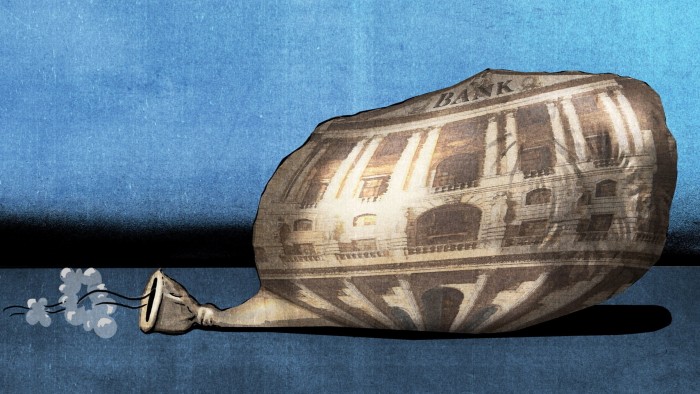Unlock the Editor’s Digest for free
Roula Khalaf, Editor of the FT, selects her favourite stories in this weekly newsletter.
There are, it turns out, plenty of people in the UK ready to cheer JD Vance’s gaslighting speech denouncing his European allies at the Munich Security Conference. One of those present likened the US vice-president’s performance to a “pissed Rangers fan” goading rival supporters, but Britain’s increasingly Maga-fied right was ready to take up the chant.
With Olympian cant Vance berated others for attempting to overturn democratic elections as if January 6 never happened, and called out free-speech failures when his own White House is banning reporters who don’t use Donald Trump-approved terminology. And all this while the US is plotting ways to carve up Ukraine’s mineral rights in some latter-day Molotov-Ribbentrop pact.
Even so, at a London conference of the faith-infused right touting the centrality of Judeo-Christian ethics this week, both the Conservative leader Kemi Badenoch and Nigel Farage of Reform UK took up Vance’s attacks. Britain, they agreed, faces a crisis of confidence, a core weakness rooted in progressive values that have eroded free speech, depressed the birth rate and powered culture-threatening immigration and economically destructive climate policies.
There are two problems with this analysis, aside from the pusillanimous failure to push back on the betrayal of Ukraine. The first is the tone. For all Vance’s humbug, not every point he made was wrong. Britain has not done nearly enough to safeguard free speech. The issue of mass-migration cannot be wished away. But the notion of a terminal moral crisis is a confection created to serve a political agenda. Progressive over-reach is real but there are already signs of a correction.
The bigger difficulty, though, is that there is a genuine crisis, just not the one those on the right wish to discuss. The true weakness is economic. The core crisis of confidence — one seen in much of western Europe — springs from the fact that the UK has lost its economic compass and has not worked out how to fund the lives that its citizens expect.
Britain has seen more than a decade of limp growth, largely stagnant household incomes and public spending that appears to deliver ever less for more. This powers the sense that politics no longer works for ordinary people. Those politicians lamenting falling birth rates might worry less about the erosion of Judeo-Christian ethics and more about why young couples are struggling to buy a home or afford to have children.
This lack of growth leaves governments struggling to fund spending. As the UK faces the urgent necessity of significant increases in defence spending it faces a Treasury arguing that they cannot be afforded. The UK tax burden is heading towards its highest ever levels yet it is not enough to adequately defend the country while funding capital investment and public services. Labour is rightly looking to find cuts in welfare spending and the perverse incentives behind a huge rise in sickness benefits. But this gets you only so far.
Sir Keir Starmer describes growth as his central priority. But Labour is facing two ways, preaching lighter regulation while heaping on extra tax and employment rights. There is little to address the productivity crisis (though raising labour costs may boost automation). A strategy of investment-led growth is bumping against spending needs and the gaps between intention and delivery. Nor is it clear, amid political pressure to cut immigration, that the UK has the skilled workers for a building boom.
At least Starmer is thinking about growth. Badenoch and those cheering on Vance appear more hamstrung. She appears to hanker for a return to Osborne economics of deregulation and free-trade in a world that has markedly changed. The Conservatives have lost their model. Having backed Brexit, and curbed trade with China, they now face a trade warrior US president slapping tariffs on allies. Many are tempted by Trump’s autarkic economic populism, though what works for the US may not be transferable.
Debate mostly comes down to on an unspecified Elon Musk-style assault on bureaucracy, though there is also confusion on the right about the role of the state and, above all, retreating from expensive net zero policies. There are arguments for these positions, though rejecting decarbonisation is short-termist. But abandoning “woke” net zero is now being elevated to almost the right’s only economic strategy.
What is missing is any focus on the UK’s potential strengths, or vision of how the country should face the artificial intelligence and clean energy revolutions. Manufacturing is fetishised over services. Badenoch even picked out higher education, one of Britain’s few global competitive advantages, for special scorn as a place where left-thinking is “poisoning minds”. There is room for more than one issue in politics but too many on the right find it more rewarding to talk up moral crises than develop a cogent growth strategy.
All the political parties lack a compelling, or even plausible, vision for future economic success. Yet this is Britain’s true weakness and addressing it should be the right’s core mission. Other issues matter. But the path to and trade-offs for prosperity ought to dominate the discourse. One minister likes to observe that “you cannot do social democracy on 1 per cent growth”. In fact, you cannot do any form of liberal democracy on economic stagnation. If you seek Britain’s central crisis, start here.




